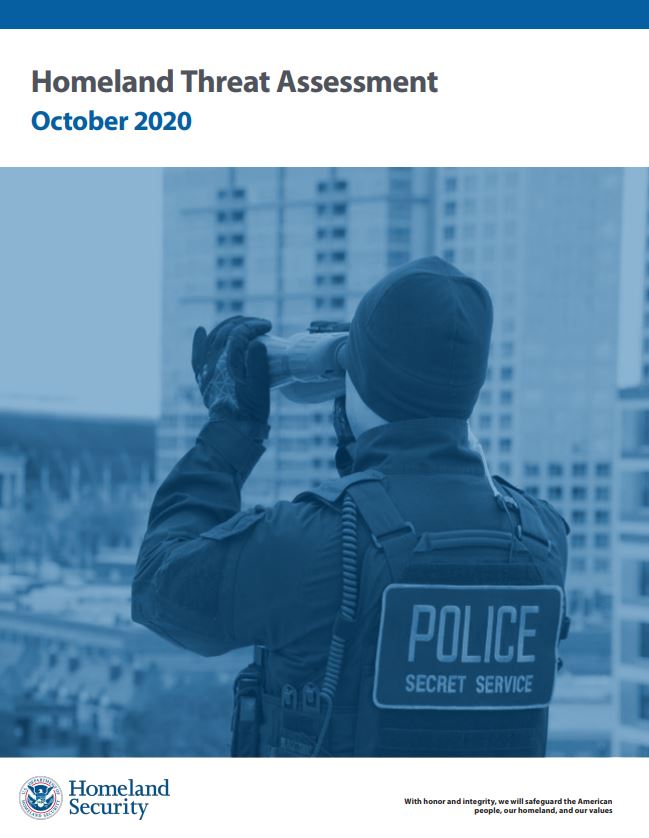
The new Department of Homeland Security assessment, written by professional intelligence community analysts, sees Iran and its Hezbollah terrorist proxy as threatening the United States along two lines: cyber-meddling in the coming presidential election and holding a sword to the nation’s throat.
By Todd Bensman
Thousands of recent headlines about the U.S. Department of Homeland Security’s first annual national threat assessment have left in their wake an impression that white supremacists pose the biggest threat to America.
But the media establishment failed to report another high-relevance threat described throughout the same document: Iran is working to disrupt the coming American election to the benefit of Joe Biden, just like the Russians who were, by contrast, relentlessly demonized for working on behalf of President Trump. The same document also warned that the Iran-backed Hezbollah terrorist organization has prepared to lethally strike in the heartland the moment Iran calls upon it to do so.
Leaks of early drafts, a whistleblower complaint charging political interference in intelligence analysis, and partisan controversy over whether it would short-shrift white supremacy dogged the Homeland Threat Assessment in the long run-up to its actual October 9 release. But after its release, media outlets and Democratic Party campaigners seemed quite happy with the white supremacy part and knighted the whole product as surprisingly credible.
That being the case, what the DHS assessment had to say about Iran’s support for Biden and Hezbollah’s malevolence toward America warrants a spotlight before the country moves on. The assessment, written by professional intelligence community analysts, sees Iran and its Hezbollah terrorist proxy as threatening the country along two lines: cyber-meddling in the coming presidential election and holding a sword to the nation’s throat.
Iranian Disinformation Campaign for Biden
The Iranian theocracy, particularly bridling under President Trump’s toughened sanctions for sponsoring violent regional mischief and global terrorism, is even more angry with the president right now for the January 8 assassination of Iranian Revolutionary Guard Corps General Qassem Soleimani. Iran’s leaders have repeatedly threatened retaliation, no matter how long it takes.
A good start, obviously, is Trump’s re-election prospects. The DHS assessment helpfully reduces much need to speculate as to which candidate Iran backs in the American election — or perhaps why this part of the DHS report drew no press coverage.
“Tehran most likely considers the current U.S. Administration a threat to the regimes’ stability,” the professional DHS analysts concluded, adding that, “Iran’s critical messaging of the U.S. President almost certainly will continue throughout 2020.”
The assessment deemed as “most alarming” the finding that Iran was “seeking to sway the preferences and perceptions of U.S. voters using influence operations.” Iranian operatives are working hard to “aggravate social and racial tensions, undermine trust in U.S. authorities, and criticize our elected officials,” DHS said.
“Americans need to understand this threat and arm themselves with all information available to avoid falling prey to these tactics.”
That’s a tall order if American media does nothing to inform the electorate that Iran is working on behalf of the Democratic nominee.
The DHS assessment doesn’t provide a lot of tactical detail as to exactly how the Iranians are operating right now. News reporting recently had it that Twitter shut down 130 accounts linked the Iran, which were pushing anti-Trump narratives. The report did note some tactics underway to push Covid-19 narratives, which happen to work for the Biden campaign’s main avenue of attack on Trump’s performance as president.
“Iranian actors have spread Covid-19 disinformation and false narratives through videos, cartoons, and news stories from state media outlets on popular social media platforms…” the report disclosed.
Left unexplained but perhaps most ominous of all was the assessment’s prediction that Iran “will try to use cyber capabilities or foreign influence to compromise or disrupt infrastructure related to the 2020 U.S. Presidential election…
“Iran continues to present a cyber-espionage threat and is developing access in the Homeland that could be repurposed for destructive cyber-attacks.”
Hezbollah Terrorism in the American Heartland
A relative few Americans familiar with how Iran uses the U.S.-designated Hezbollah terrorist organization in foreign policy know it has infiltrated operatives throughout the United States, trained to kill and collect intelligence on targets. In 2018, for instance, I have extensively reported about how Hezbollah infiltrated its “Unit 910” operatives throughout the country who were loaded and cocked to strike their prepared list of targets when Iran gave the word.
As a matter probably separate from concerns about election meddling, the DHS threat assessment acknowledged that Hezbollah operatives like that were still inside the country and posed a grave threat.
“The government of Iran and its proxy, Lebanese Hizbollah (LH), have demonstrated the intent to conduct an array of operations in the Homeland,” the assessment disclosed. “Iran or LH could advance an attack plot — with little to no warning — in response to heightened tensions.”
The US government, it said in a probable reference to the cases I wrote about, “has arrested several individuals acting on behalf of the Government of Iran and LH who have conducted surveillance indicative of contingency planning for lethal attacks in the U.S.”
White supremacy certainly is a serious threat that deserves its time in the spotlight, as well as resources. It would be shameful if US media outlets passed on what DHS had to say about Iran because the ruling mullahs were working in the shadows to defeat Donald Trump.
But the nation need not be forced to choose one over any other threat problem. The American homeland security establishment can handle more than one threat at once.
But so can the American media and the public it is supposed to serve.
Todd Bensman in the author of the forthcoming book (Posthill Press/Bombardier Books): America’s Covert Border War, the Untold Story of the Nation’s Battle to Prevent Jihadist Infiltration